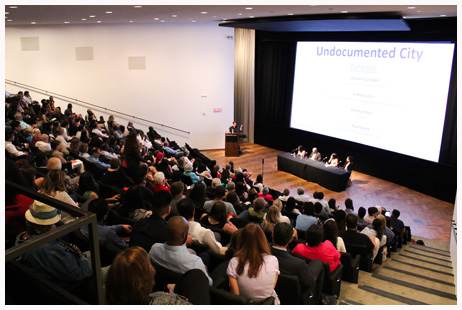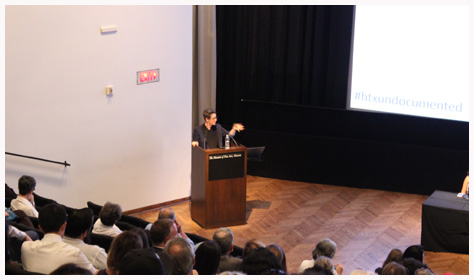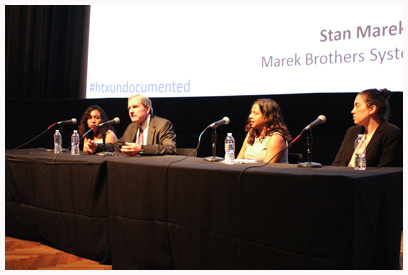The folllowing article was authored by Scott Braddock and originally published on Construction Citizen.
 Immigrant rights activists, experts in the law, and business leaders gathered Wednesday night in Houston to talk about challenges the region faces following the convergence of a state crackdown on “sanctuary cities,” a devastating hurricane, and the impending end of a federal program that allows young undocumented immigrants a chance at employment without fear of deportation.
Immigrant rights activists, experts in the law, and business leaders gathered Wednesday night in Houston to talk about challenges the region faces following the convergence of a state crackdown on “sanctuary cities,” a devastating hurricane, and the impending end of a federal program that allows young undocumented immigrants a chance at employment without fear of deportation.
A 90-minute discussion at the Museum of Fine Arts Houston presented by the Kinder Institute for Urban Research at Rice University and the Houston Immigration and Legal Services Collaborative featured speakers from various walks of life. The talk also played out just as confusion was unfolding in Washington about whether President Donald Trump and Democrats had indeed struck a deal to make permanent the Deferred Action for Childhood Arrivals, or DACA, program.
“We have to talk about Houston as an immigrant city,” said moderator Kate Vickery, who noted that nearly 600,000 undocumented people live in the Bayou City. “We can’t not talk about that,” she said, which is why the event was called “Undocumented City.”
“Immigration impacts the work that you do whether you know it or not,” Vickery said to kick off the event that had not been originally planned to focus on Hurricane Harvey’s aftermath. Any discussion of Houston’s future, however, would need to include the storm, Vickery said.
There was already an “extreme” shortage of workers in Southeast Texas prior to Hurricane Harvey, said Stan Marek, President and CEO of MAREK. “Now that we have this terrible catastrophe, I don’t know where we’re going to get the workers to rebuild Houston.” Marek said the construction industry’s challenge in finding a robust workforce will be much different from the aftermath of previous disasters like Tropical Storm Allison in 2001 or Hurricane Katrina in New Orleans in 2005.
That’s partly because Texas has posted the equivalent of a “Not Welcome” sign in the form of Senate Bill 4, a ban on “sanctuary cities” demanded by Governor Greg Abbott this year, Marek said. Parts of the law are on hold for now thanks to a federal court challenge. On top of the message sent by SB4, an improving economy means there is more construction work underway in other states, giving many undocumented people  even less incentive to relocate to Texas. Many workers, documented and undocumented, have refused to show up on Texas construction sites following the passage of Senate Bill 4, fearing local police will round them up.
even less incentive to relocate to Texas. Many workers, documented and undocumented, have refused to show up on Texas construction sites following the passage of Senate Bill 4, fearing local police will round them up.
Andrea Gutin, an attorney with the Houston Immigration and Legal Services Collaborative, talked at some length about the fact that undocumented immigrants do not qualify for FEMA benefits, regardless of whether they lost most or all of their possessions in the hurricane. That’s why the collaborative is offering other ways to help immigrants who were victims. You can check that out on their website.
“A lot of immigrants did not seek shelter during Harvey,” Gutin said, because they feared the shelters were not safe places for them, given the presence of law enforcement including Customs and Border Patrol. Harris County leads the nation in deportations, Gutin said. “In this immigration climate, no immigrant is safe,” she said. “It’s another layer that adds a whole host of issues and further traumatizes people who were already traumatized.”
Rachna Khare runs an organization called Daya, a nonprofit primarily aimed at helping South Asian immigrant women who have been victims of sexual assault and exploitation. Khare told the crowd of about 150 people that the plight of those women has been exacerbated by passage of the ban on “sanctuary cities.” Many women were already fearful of deportation proceedings – leading to the potential loss of their children in a significant number of cases – that could result from reporting abuse.
It’s “an especially heinous kind of abuse” when women who are undocumented face deportation back to their countries of origin and separation from their children, Khare said. “The fear of being deported is greater than the fear of the abuse that you face day after day,” she said. “It’s a huge barrier.”
“If the government had a little more heart and a little more human in them they wouldn’t do these things,” said Damaris Gonzales, a DACA recipient who works with United We Dream Houston to advocate for people in her situation. Gonzales said she first learned she was undocumented when she was 12 years old. “I knew that I grew up without any opportunities,” she said. She painted a picture of prejudice and racism, even in places she didn’t expect it including churches. But much of that changed when DACA was enacted under President Barack Obama, Gonzales said. “I got a job and I got a car and it’s embarrassing to say I didn’t learn to drive until I was 30,” she said of immediate changes she saw after DACA was implemented.
But much of that changed when DACA was enacted under President Barack Obama, Gonzales said. “I got a job and I got a car and it’s embarrassing to say I didn’t learn to drive until I was 30,” she said of immediate changes she saw after DACA was implemented.
Marek, the construction executive, said that now that President Trump has announced the DACA program will be ended in six months, it is crucial for Congress to take action after decades of declining to adopt an updated immigration policy. “The permanent fix has to come from Congress,” Marek said, urging people in attendance to call or write to their member of the US House and Senator John Cornyn.
After DACA is made permanent through legislation, Marek said, a broader immigration solution could begin with granting legal status to undocumented workers who can pass a background check, agree to be part of the E-Verify system, and work for employers who pay and match taxes. “It’s called ID and tax,” Marek said.
“The bottom line is let's start working on the problem,” Marek said. “It would be a stepping stone toward whatever the eventual fix will be.”

